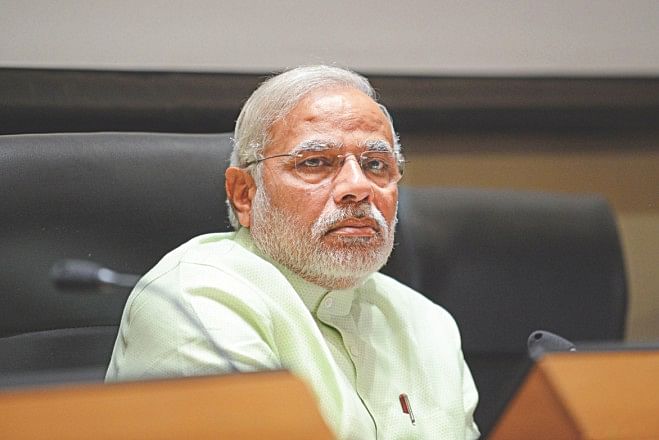A case of rule and divide

Ali Husain is a prosperous young Indian Muslim businessman. He recently bought a Mercedes and lives in a suburban-style gated community that itself sits inside a ghetto.
Husain is one of roughly 400,000 people living in Juhapura, a teeming Muslim township within Ahmedabad, Gujarat's largest city. Many of them moved there after the 2002 riots. Local Hindus jokingly refer to it as "Little Pakistan".
Husain embodies the paradox of Gujarat: the state's pro-business leadership has created opportunities for entrepreneurs of all creeds; yet religious prejudice and segregation are deeply, and even legally, engrained.
In Gujarat, it is so difficult for Muslims to buy property in areas dominated by Hindus even the community's fast-growing urban middle class is confined to cramped and decrepit corners of cities.
Separation of communities is common across India. Nowhere is it as systematised as it has become in Gujarat.
And Narendra Modi, would be prime minister of India, is the chief minister of the state since 2001. He has surrounded himself with technocrats - and also ministers and advisers who promote "Hindutva", a belief in the supremacy of Hinduism.
As prime minister, Modi would lead not just 975 million Hindus but 175 million Muslims, around 15 percent of India's population and the third-largest Muslim population in the world.
Modi's record in his home state is clouded by riots in 2002, when 1,000 people, mostly Muslims, died in a frenzy of mob violence. Modi still struggles to shake off the accusations.
On the campaign trail, Modi has tried to project a moderate image with a platform that downplays hot-button Hindu issues and emphasises growth and "development for all".
But in Gujarat's neighbourhoods and cities, people tell a different story. Memories of the 2002 rioting have not faded for the many residents of Juhapura who lost relatives, homes and businesses. And its legacy has been increasing segregation.
In particular, a property law unique to Gujarat has perpetuated segregation, creating ghettos such as Juhapura and a sense of apartheid in some urban areas.
The "Disturbed Areas Act", a law that restricts Muslims and Hindus from selling property to each other in "sensitive" areas, was introduced in 1991 to avert an exodus or distress sales in neighbourhoods hit by inter-religious unrest.
Modi's government amended the law in 2009 to give local officials greater power to decide on property sales. It also extended the reach of the law, most recently in 2013 - 11 years after the last major religious riots.
The state government says the law is meant to protect Muslims, who account for just under 10 percent of the state's 60 million people. Critics say the act's continued enforcement and the addition of new districts covered by it - about 40 percent of Ahmedabad is now governed by the law - means it is effectively being applied as a tool of social engineering.
The Indian Express newspaper said in a recent editorial: "More Muslims and Hindus have moved into separate spaces in Gujarat, finding trust and assurance only among neighbours of their own community, and it has ended up entrenching segregation and shutting Muslims out of the mainstream."
However, according to National Survey Sample Office figures, for instance, Gujarat is one of the top Indian states for Muslim employment. The national unemployment rate among Muslims was almost double that of Gujarati Muslims in 2009-10.
That made Modi a popular figure among affluent Muslims. Even much poorer Muslims back Modi.
"Modi has done some good work. Our children can get scholarships and school meals. Women feel protected, and widows get compensation," said 48-year-old Shabnam Banu, sitting on the floor with her friends in a simple room where a slow-moving ceiling fan did little to alleviate the pre-monsoon heat.
Still, Banu herself couldn't bring herself to vote for Modi, selecting the "none of the above" option on election day.
"Our main fear is he will throw us out of the country," she fears.

 For all latest news, follow The Daily Star's Google News channel.
For all latest news, follow The Daily Star's Google News channel. 




Comments